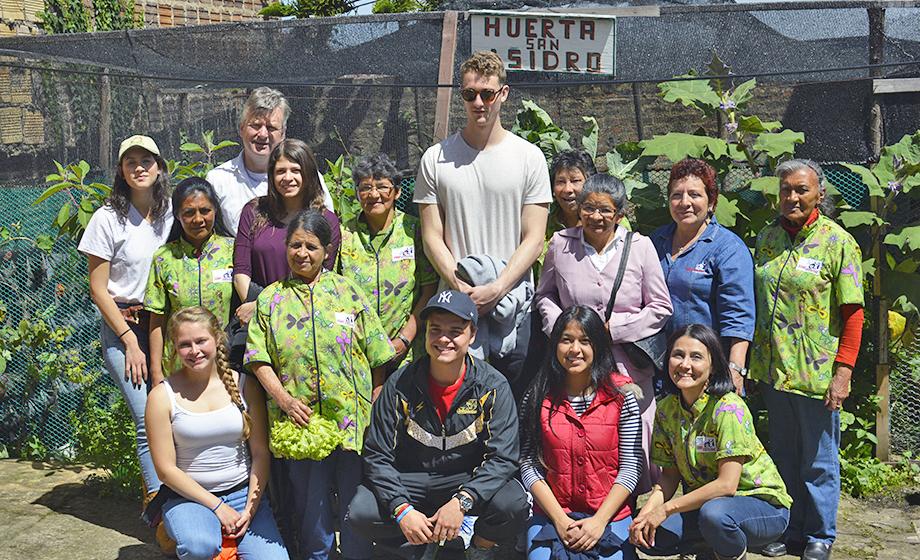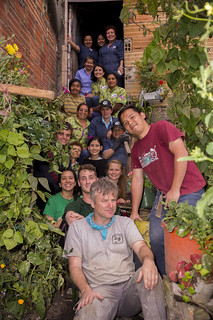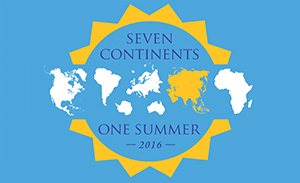 Millennials, now the “largest segment of the U.S. labor market,” have latched on to social entrepreneurship, seeking to use innovative ideas to solve the world’s most pressing problems, Forbes reports. They want to support and work for businesses and organizations that make a difference.
Millennials, now the “largest segment of the U.S. labor market,” have latched on to social entrepreneurship, seeking to use innovative ideas to solve the world’s most pressing problems, Forbes reports. They want to support and work for businesses and organizations that make a difference.
A longtime social entrepreneur and successful business owner in Nova Scotia, John Dobson, associate professor of practice in Clark’s Innovation and Entrepreneurship program, tapped into this millennial spirit when he designed an undergraduate research and service learning project that sparked the interest of two Clark University students and two recent graduates: Sydney Tanguay ’18, Carla Lee Perez ’19, Duncan Hardy ’16 and Julia Carrasquel Marquez ’16, an incoming fifth-year graduate student in international development and social change.
They traveled with him to Bogotá, Colombia, recently to work with a non-profit organization that helps impoverished women feed and support their families by growing organic produce in their backyard gardens. Two of the students, Tanguay and Lee Perez, pursued the experience as part of a Clark LEEP project; the two others paid their own way.
“I was very pleased that four students signed up to come along,” Dobson says. “This shows the level of commitment that Clark students have towards service.”
This story is part of our 7 Continents, 1 Summer series, which highlights the interesting work that Clark students, faculty, alumni and staff are doing all over the world. Have a great story of your own to share? Let us know and we’ll be in touch.
The students are “applying entrepreneurship skills to a development context,” he says, and “using the tools that they learned in their entrepreneurship class to help women entrepreneurs.”
The students arrived in Colombia on June 2 to work with the nongovernmental organization (NGO) Fundación Mujeres Empresarias Marie Poussepin (or Marie Poussepin Women Entrepreneurs Foundation) for almost two weeks. Dobson learned about the NGO when he visited Colombia last year as keynote speaker for an entrepreneurship conference at Pontifical Javeriana University.
“I was introduced to Ruth Vargas, a wonderful lady who started this project,” with her aunt, Alicia Vargas, he recalls. “I was taken to a very poor area of Bogotá and introduced to a small group of women entrepreneurs who had converted their backyards into organic agricultural gardens.”
The women, all grandmothers who head households, needed to make money but still wanted to keep a watchful eye on their grandchildren. A religious order started the project to help them “gain some level of control over their lot in life,” Dobson explains.
Currently, the women make 100,000 pesos, or a little over 30 U.S. dollars, a month. “While that may not seem like a lot to us, for them it makes a world of difference, allowing them to pay for health and education for their family,” Dobson says.
The project allowed the Clark students put what they’ve learned in the classroom into practice by getting their hands dirty by building a new urban farm for a family.
“We encountered many problems in converting the backyard into a farm, but the students persevered,” Dobson says. “After three days of very hard work, we were able to finish clearing the land, building the greenhouse and installing the wooden frame, which is needed to keep animals out and help maintain the land clean.”
The students worked alongside eight others from Javeriana University, a co-sponsor of the project. “Their faculty provided immense support,” says Dobson, who speaks fluent Spanish. “Dr. Yovani Castro and Dr. Nathlay Pinzon helped me organize the project. They provided all the logistical support.”
Grandmothers from the nearby farms “fed us wonderful salads from the farms and made drinks from local fruit,” he says, “and they always had a hot cup of coffee for me.”
When they weren’t building the farm, the Clark students focused on their academic work, drawing upon the theory they learned in the entrepreneurship class with Dobson this spring. They developed a business model for the urban farms, researched the customers’ needs and explored the agricultural business sector where the grandmothers compete to sell their produce.
For the rest of the summer, they will work with Dobson to examine the results and write a case study in sustainable agricultural entrepreneurship, aiming to submit it for publication.
Dobson brings much entrepreneurial experience to the effort. A Canadian born in Mexico, he started a wholesale and retail import business at age 18. It grew into a multimillion-dollar business that he sold in 2007 to begin a career in academia.
Overall, the project in Colombia, he says, “was a transformative experience for the students. I hope to make it an annual trip.”
Pictured at top: Clark University students Sydney Tanguay (bottom row, far left); Julia Carrasquel Marquez (back row, far left); and Duncan Hardy, back, center; their professor, John Dobson (back, second from left) along with gardeners from Marie Poussepin Women Entrepreneurs Foundation and students from Pontifical Javeriana University. (Photo at top by by Huang Hak Tang Zhu; photo on stairs




